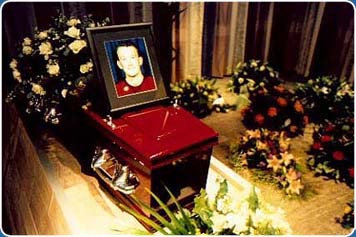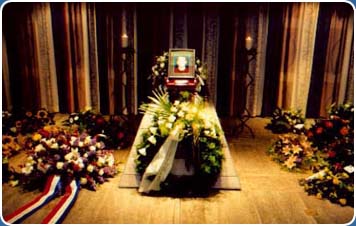|
On
September 30, 1999, Sander was cremated in his home town of
Enschede, The Netherlands. Several friends and colleagues
gave speeches. Here, you can find Eveline's
speech and Richard
Lambert's speech.

Eveline's
speech
I'd
like to start with a big welcome for everybody and thank you
for being here.
That's
one of the strange things for us, as family; to realise now
how many friends Sander had and how many people he knew.
I'm
just his little sister. He was always my big brother, who
was traveling around the world and living in faraway countries.
He would come back to Holland once or twice a year, and he
would take me to the beach, or some other place, to walk and
ask me how I was, and what I had been doing. I have had so
many good conversations with my big brother and he really
helped me out with some good advice more than once.
And
he would tell funny things that happened in his life; in Russia,
in Kazakhstan and in Indonesia.
But
in Holland he never talked so much about his work. He never
boasted about anything. I remember one e-mail of him saying
that he didn't really have any news to tell me, and at the
bottom he wrote "oh yeah, and I shook hands with Habibie."
That was Sander.
He
actually taught me how to windsurf, and how to dance the 'cha-cha-cha':
me standing on his feet and holding on to him tight, and he
would dance with me. I was maybe six and he was fifteen.
As
a child he used to read a lot. He had literally hundreds of
childrens' books, and later he wanted me to read them, too.
He would actually blackmail me, and say: no, you can't have
that cookie until you've read the entire book of 'Pinkeltje'.
I hated him for that.
But
I learned so many things from him. He was my big example,
and that's what he will always be, not only for me. Only now
I realise, that Sander was not just my big brother; he was
many people's friend and colleague, and a very special one.
Also for me: he was not just special for being my own brother.
Hundreds of people have all these good memories of Sander,
and those memories are there to stay forever.
We
have actually laughed our heads off some times in the past
few days, talking about Sander and remembering the way he
was and the things he would do.
When
our father, for example, would make tea for us, Sander would
always take a good look at it first, and often concluded,
when it was too strong, "this is not tea, it looks like coffee".
He used to call this kind of tea 'heart attack tea' ('hartverlammingsthee')
and I always had to laugh about this.
He
lived on tea; since he didn't drink any coffee, he always
drank tea. And when I drink tea, I usually put sugar in it.
"Yak! How can you put sugar in your tea!" he'd say. "That
is disgusting."
Those
few days that he would spend with us were always fantastic
and I'd look forward to them for weeks. And exactly because
of the reason that we spent so little time together, our contact
was always very intense. We would have good conversations
and do fun things every single time we would be together.
That was the great part about my far-away-brother.
Actually
I think there was no better place for him to die than where
he did: at work. Because his work was his life and that is
what he died for.
He
went to East Timor to show the world the truth,... and that
is what he did.
Eveline
C Thoenes

Richard Lambert's speech
I
am here on behalf of Sander's friends and colleagues on the
Financial Times, and of many readers around the world, to
tell you about our pride and respect for him as a journalist,
and our sense of shock and sorrow about what has happened.
And I want to convey our deepest sympathy to his family, and
to Ian.
In
the past week, our office has been flooded with e-mails and
letters.
Some
came from his colleagues and friends. They spoke of his enthusiasm
and charm, of his boundless curiosity, of his generosity and
courage.
That's
my enduring memory of him too. Our first meeting was in Moscow,
when he was still working for the Moscow Times. He cornered
me at a cocktail party, and with energy, determination and
charm told me how - one day - he was going to work for the
Financial Times, more or less whatever I might feel about
the idea.
Some
letters came from the great and good, the people he wrote
about, or whom he came across in his professional career.
They
spoke of his integrity and persistence, and of the respect
they felt for him. They said he had made a difference.
And
some came from people who only knew him through his work,
and who admired and respected him for that.
I
quote from one letter:
"I
never met him, but I feel as though I have lost a personal
friend who kept me in touch with a distant and difficult part
of the world."
Over
the past few days, I have been re-reading what Sander wrote
for the Financial Times in recent months.
Several
things have struck me.
One
is the sheer breadth of his reporting.
In
the last two weeks of his life, he wrote not just about the
horrors of East Timor or the political manoeuvrings in Jakarta.
He also published pieces on the country's banking scandal,
and - as you might expect from the Financial Times - on the
performance of its stock market.
Another
was the quality and sophistication of his analysis. In particular,
I'm thinking of a feature he wrote just a few weeks ago about
the shifting balance of power in the Indonesian military.
A
third striking quality I noticed: his reporting is always
illustrated by the voices of real people. He wasn't satisfied
just to go to the press briefings or to work through the approved
press intermediaries. He wanted to know what people who were
actually on the front line were thinking.
I'll
give you just one example.
At
the end of August, he noted that red and white Indonesian
flags were fluttering across a town in the mountains of East
Timor. But, wrote Sander, these flags should not give the
president hope. "I don't have the option not to fly the flag",
he quotes one farmer as saying. "I'm forced to do it." The
final thing I noticed, subtle but unmistakable, was a growing
sense of frustration and then anger about what was happening
in East Timor. There's the cool analysis, yes. But there's
also something else.
At
the end of a long and powerful feature we published just three
weeks ago, he quoted a rather pompous remark from the New
Zealand foreign minister, a Mr McKinnon.
Then
came the final paragraph.
"Mr
McKinnon forgets what is on the line first of all: the lives
of some 800,000 Timorese, who trusted the United Nations to
bring them not just a ballot, but a future."
Like
everyone here, I suppose, I have spent the last days trying
- and failing - to make sense of what has happened.
Casting
around, I've found three sources of comfort, which I will
share with you.
One
is that Sander loved what he was doing, and he was very good
at it. He had wanted for a long time to work for the Financial
Times, in Indonesia, and he had the satisfaction of knowing
that his work was widely admired.
The
second is that he was not a reckless man. He thought carefully
before he exposed himself to danger.
In
the words of someone who was with him in Dili last week:
"What
he did that day was within the limits of what a reporter has
to do to find out what is really happening."
Third,
and perhaps most important of all, what he was doing mattered.
A lot of what gets published in newspapers is routine information.
But there is more to it than that. Reporters, especially those
who work in difficult and remote parts of the world, give
us the tools which help us to understand complex issues, and
to make judgements on which policymakers must, eventually,
take action.
Finding
out what is really happening is important.
The
conflict in East Timor threatens to change the map of Asia.
There
is growing uncertainty in the region - an uncertainty which
emanates from the towns of Timor and which echoes in Washington,
Tokyo and other Western capitals.
Policies
that affect the lives of millions of people are being influenced
by reports from the streets of Dili.
Sander
reported what he saw. He brought the honourable qualities
of intelligence and objectivity to a place of horror and of
chaos. No journalist, no citizen, could have done more.
|